This shrimp spaghetti recipe is the perfect choice for an easy-to-make dinner that's sure to impress. Combining succulent shrimp with a flavorful garlic and tomato sauce, this dish offers a delicious blend of tastes and textures and is a great way to switch up the classic version.
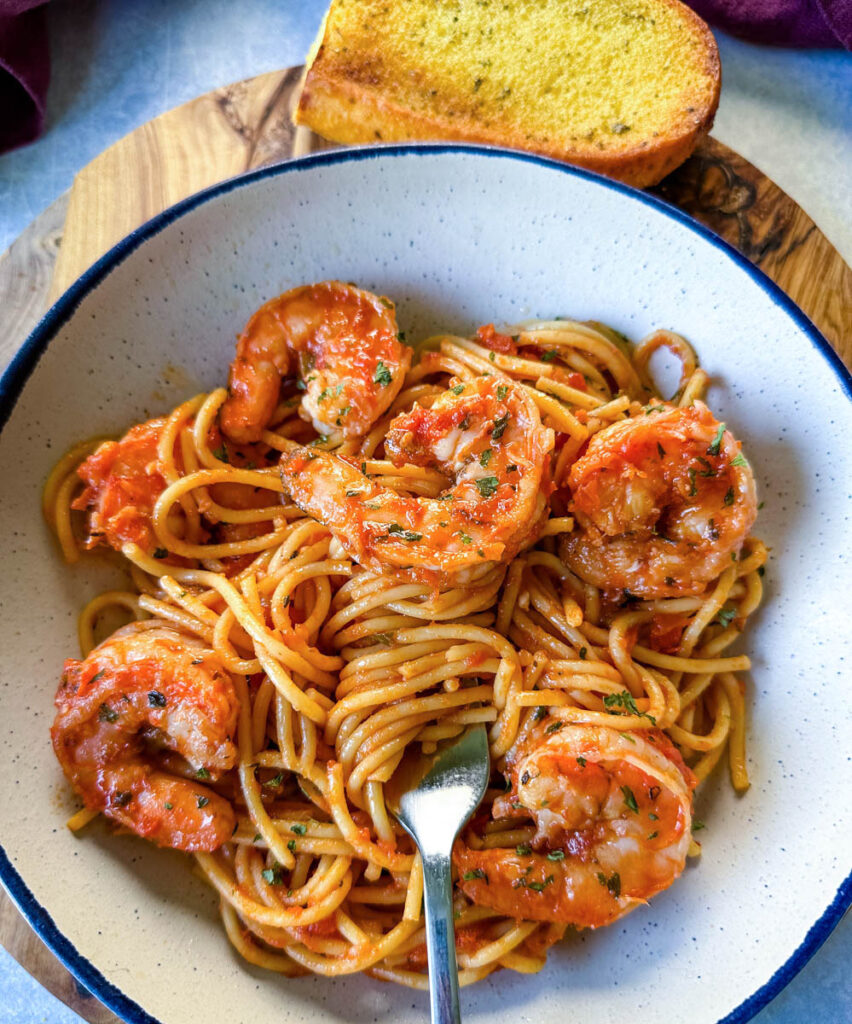
Want to save this recipe for later?
This post contains affiliate links. Please read my full disclosure here.
Table of Contents
Key Ingredients
- Spaghetti pasta
- Olive Oil
- Shrimp
- Spices
- Salt and Pepper
- Onions
- Bell Peppers
- Garlic
- Crushed Tomatoes
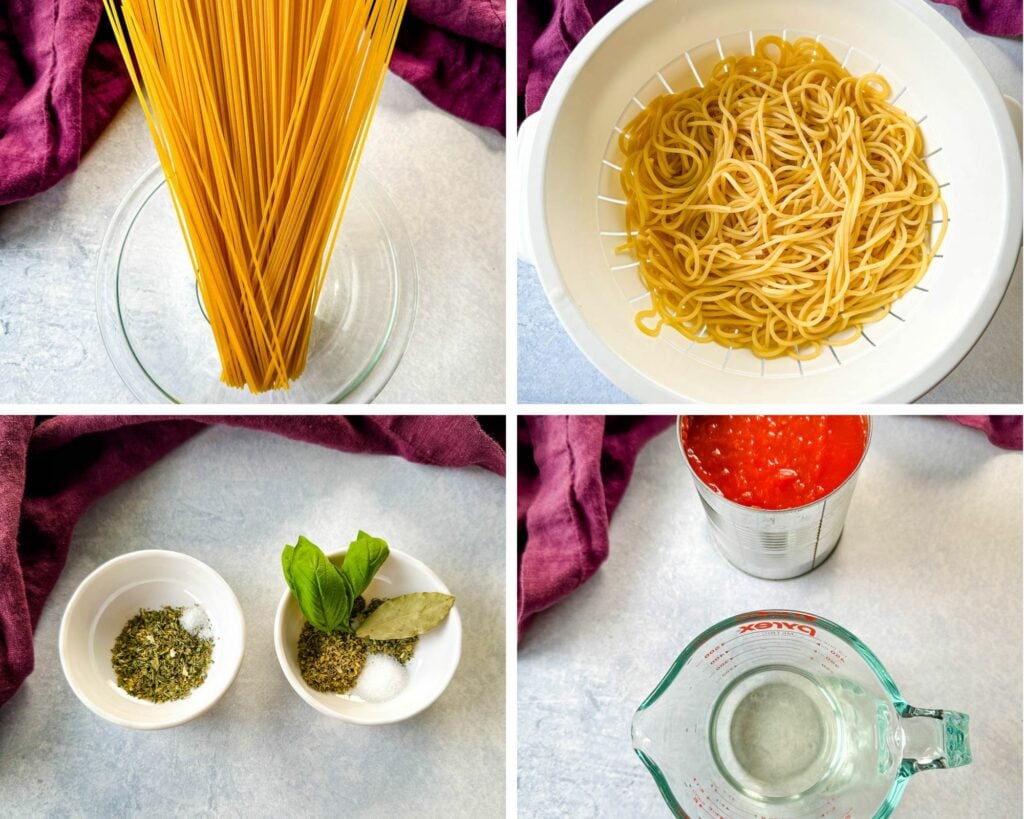
What Type of Pasta to Use
I’m using spaghetti pasta. Choose a pasta shape that complements the size and texture of the shrimp, and one that you enjoy both in terms of taste and presentation. You can use whatever type of pasta you like including whole wheat (cook in accordance with the instructions on the package) or low carb spiralized vegetables. Here are more options:
- Linguine: Similar to spaghetti but slightly wider. It has a slightly flatter profile that can hold onto the sauce and shrimp.
- Fettuccine: Wider and thicker than linguine or spaghetti. It creates a hearty and satisfying base for your shrimp and sauce.
- Angel Hair: For a lighter option, you can use angel hair pasta. It's very thin and delicate, cooking quickly and providing a delicate texture.
- Bowtie (Farfalle): A fun and versatile choice.
- Penne: Has a tube-like shape that can hold sauce and shrimp. It's a great option if you want a more substantial pasta shape.
What Type of Shrimp to Use
- Size: Larger shrimp are generally preferred for shrimp spaghetti because they offer a meatier texture and more prominent flavor. Some people also prefer medium-sized shrimp because they are easier to eat with pasta in a single bite.
- Peeling and Deveining: For convenience, consider using peeled and deveined shrimp. This will save you time and effort during preparation.
- Fresh vs. Frozen: If you have access to fresh, high-quality shrimp, that’s the best option. However, frozen shrimp can work well too, especially if they are frozen shortly after being caught to preserve their quality. Thaw frozen shrimp before using them in the recipe.
- Tail-On or Tail-Off: The choice of whether to leave the tails on or off is largely a matter of personal preference. Leaving the tails on can enhance the presentation of the dish, but removing them will make eating more convenient.
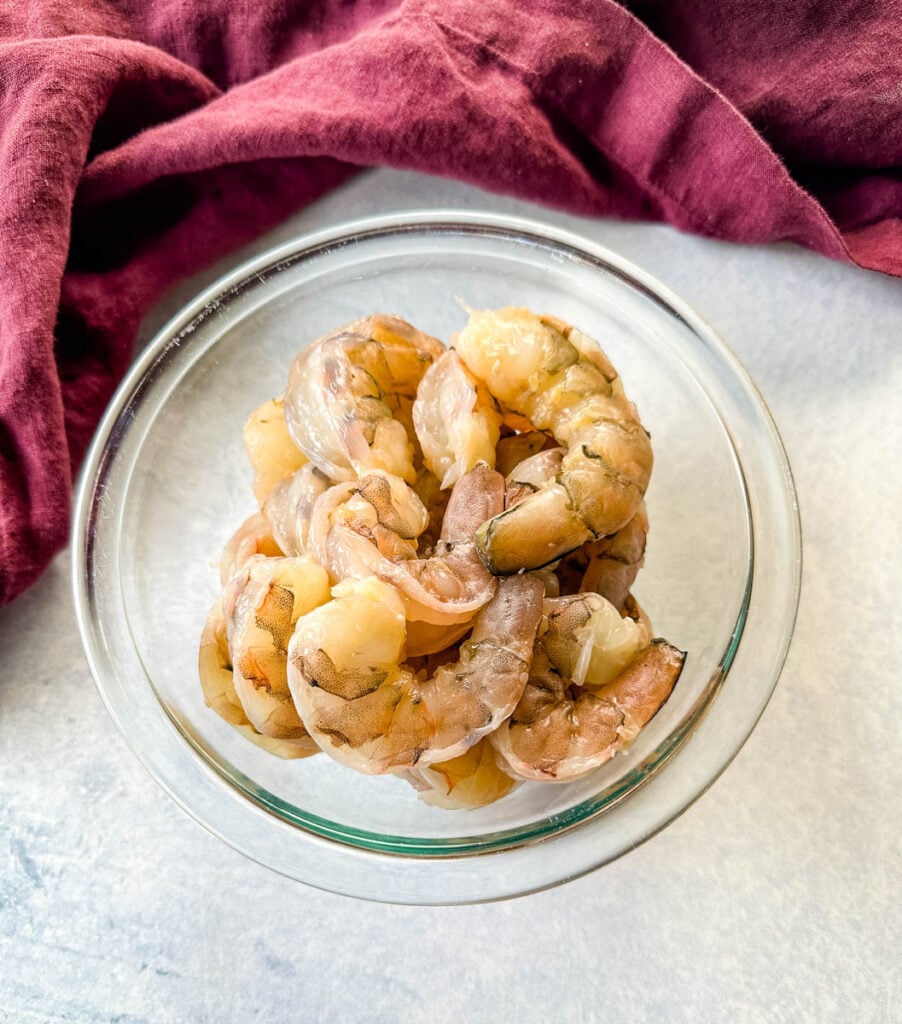
How to Make Shrimp Spaghetti
Detailed measurements and full instructions can be found in the recipe card at the bottom of this post.
- Cook the spaghetti in accordance with the instructions on the package.
- Place a large pot or Dutch oven on medium-high heat
- Season the shrimp with Italian Seasoning, salt, and pepper to taste.
- Add the seasoned shrimp to the pot and cook.
- Remove the shrimp from the pan and set aside. Add in onions, green peppers, red peppers, and garlic. Saute.
- Add in crushed tomatoes, Italian seasoning, bay leaf, oregano, basil, salt, pepper, and wine. Stir.
- Fold in the cooked spaghetti and stir.
- Cover and simmer.
- Open the pot and remove the bay leaf. Add the cooked shrimp to the pot and serve.
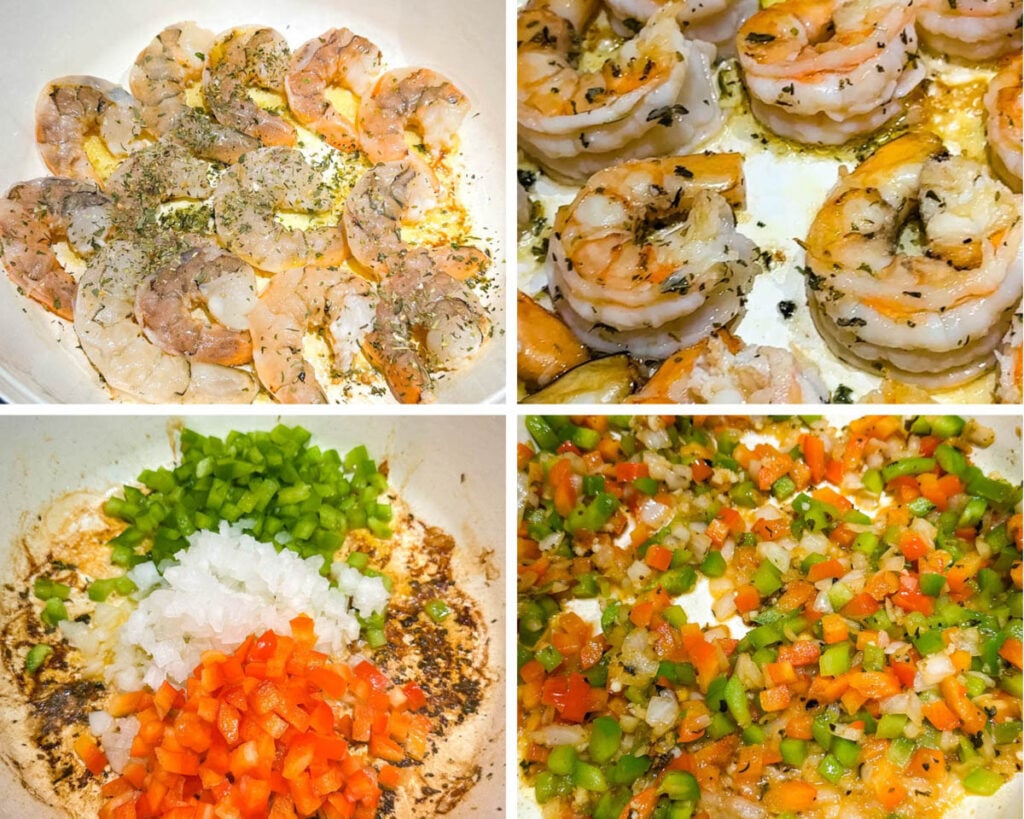
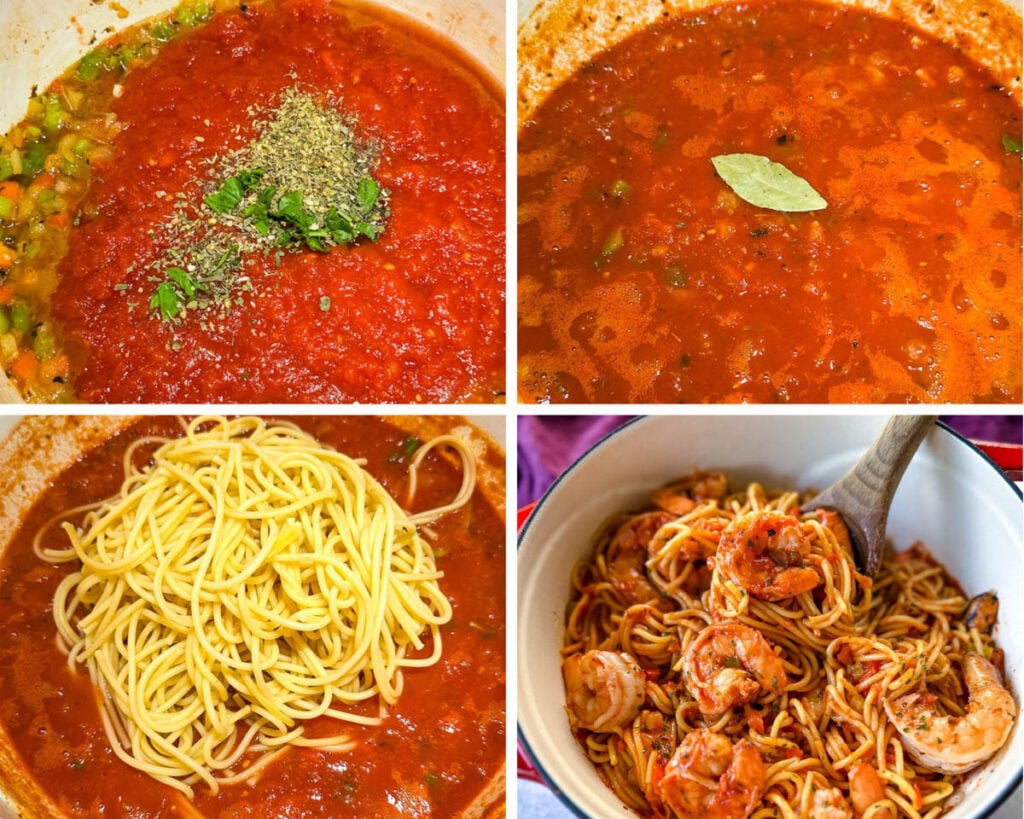
Do You Break the Spaghetti in Half
People often break their spaghetti in half so that it will fit in the pot they are using to cook the pasta. I find I don’t need to do this and it’s frowned upon, especially in Italian culture. Some even consider it bad luck. The pasta is meant to be eaten by twirling it around your fork. It’s hard to do that if you have smaller pieces.
It won’t harm the pasta if you do! So if you must, feel free!
Use a pot that is large enough to fill 5-7 quarts of water. Once you add the spaghetti to boiling water it will wilt down quickly and fit the pot.
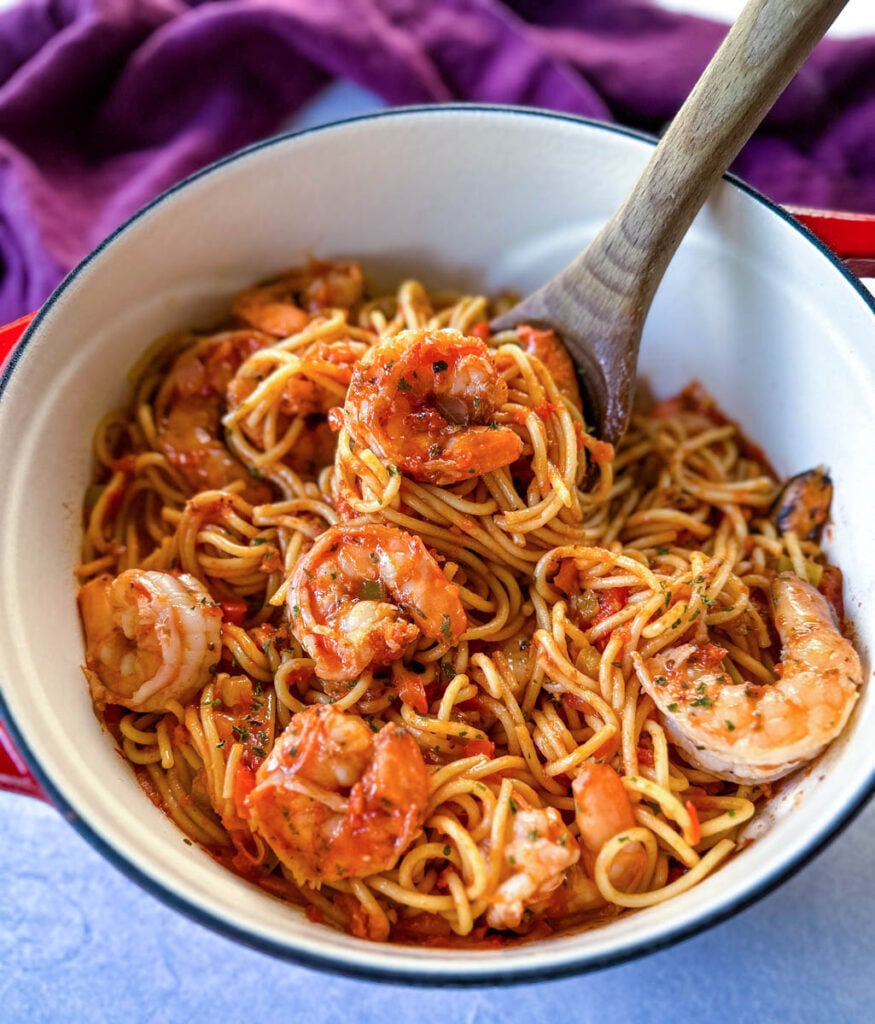
Add Salt to the Water When Cooking the Pasta
The salt will keep the pasta from being sticky and slimy. I usually add a teaspoon.
What Type of Pot to Use
I’m a huge fan of making this a one-pot recipe. I go for this 7-quart Dutch oven. It’s large enough to cook the pasta in and it can withhold higher heat for sauteeing the vegetables and shrimp. If you want to make this using one pot, grab one that’s large enough and retains heat well.
If you use a smaller pot, the pasta has less water to cook in. This results in a higher amount of starch in the pot, which will cause your pasta will to come out sticky after you drain the water. To be safe, always go for a big pot, even if you’re only cooking a small amount of pasta. You can read about more Common Mistakes When Cooking Pasta here.
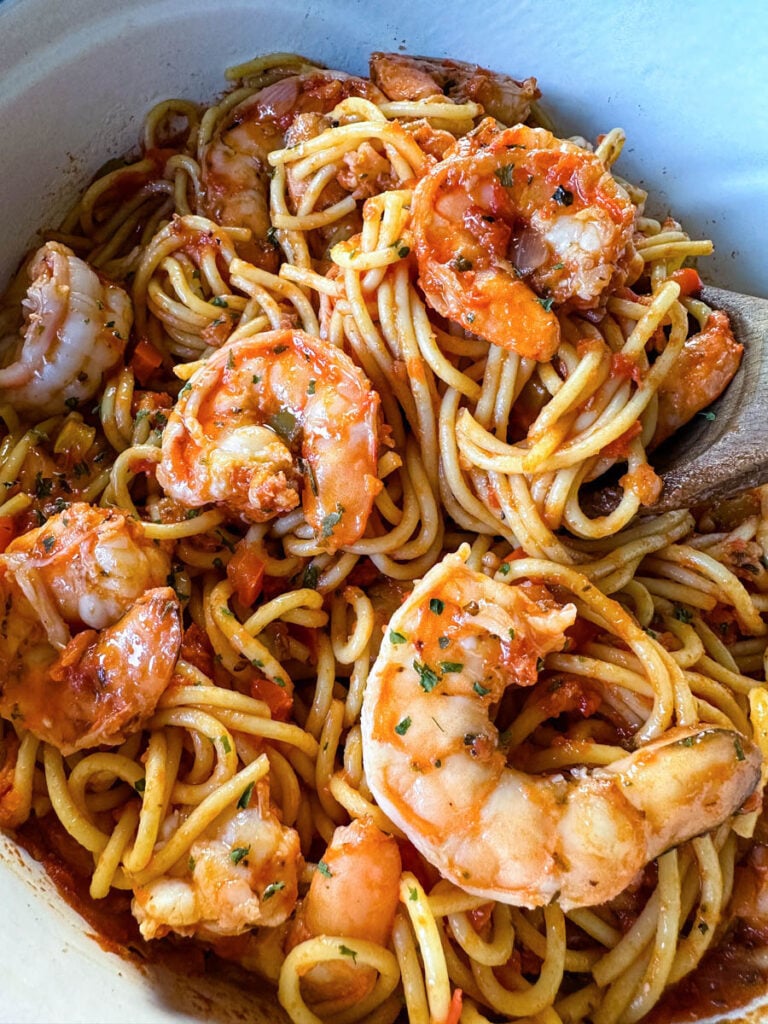
Homemade Marinara vs Store Bought Sauce
You can use any of your favorite store-bought marinara sauce for this recipe. I like to make my own because it's really simple to do. Here are the key ingredients:
- Crushed Tomatoes
- Dry White Wine (I use Pinto Grigio)
- Basil
- Oregano
- Bay Leaf
- Italian Seasoning
- Onions
- Garlic
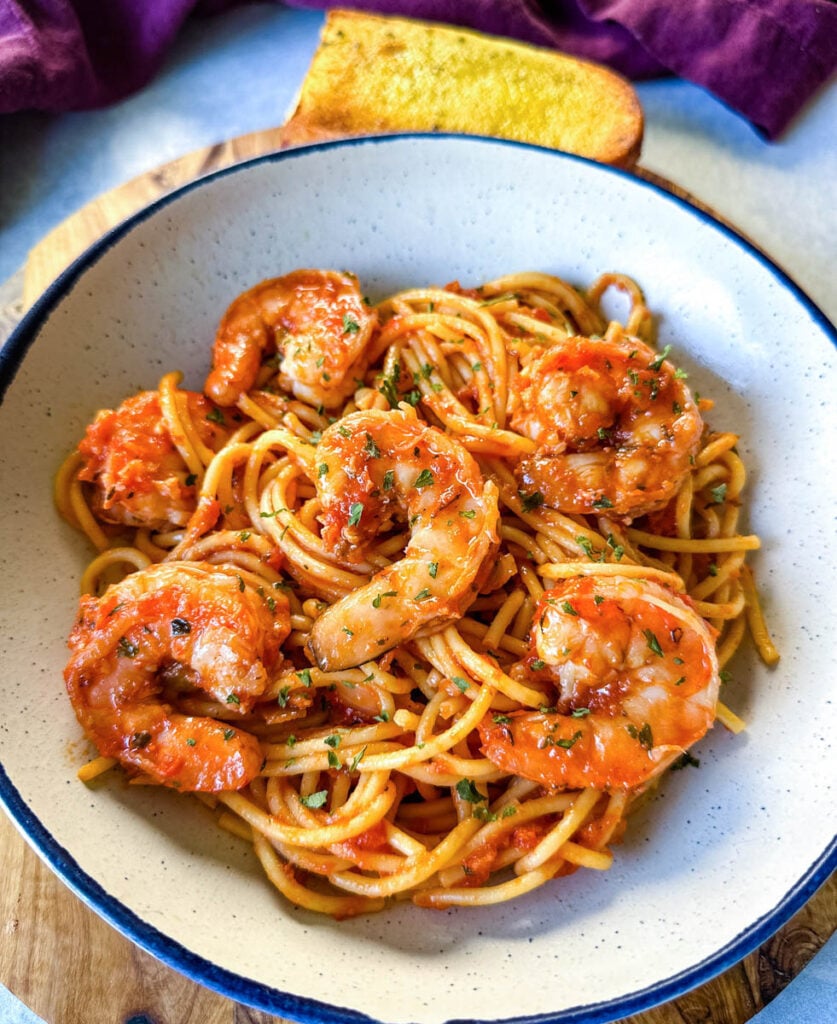
Avoid Overcooking the Shrimp
Here are some things you should look for when cooking shrimp:
- Cooked shrimp will turn pink and opaque. The shrimp will also become firm when you touch it.
- Perfectly cooked shrimp usually has a C-shape, as opposed to a tightly curled O shape.
- For perfectly cooked shrimp, a meat thermometer is a wonderful tool. Ensure that the shrimp has reached an internal temperature of 145°F.
- You can also cut the shrimp open by making a small cut into the shrimp. If it’s cooked, the shrimp should be white and opaque all the way through.
Overcooked shrimp is grayish-white in color. The flesh is tough and rubbery. A bland taste and a lack of sweetness is a sign the shrimp has been cooked too long.
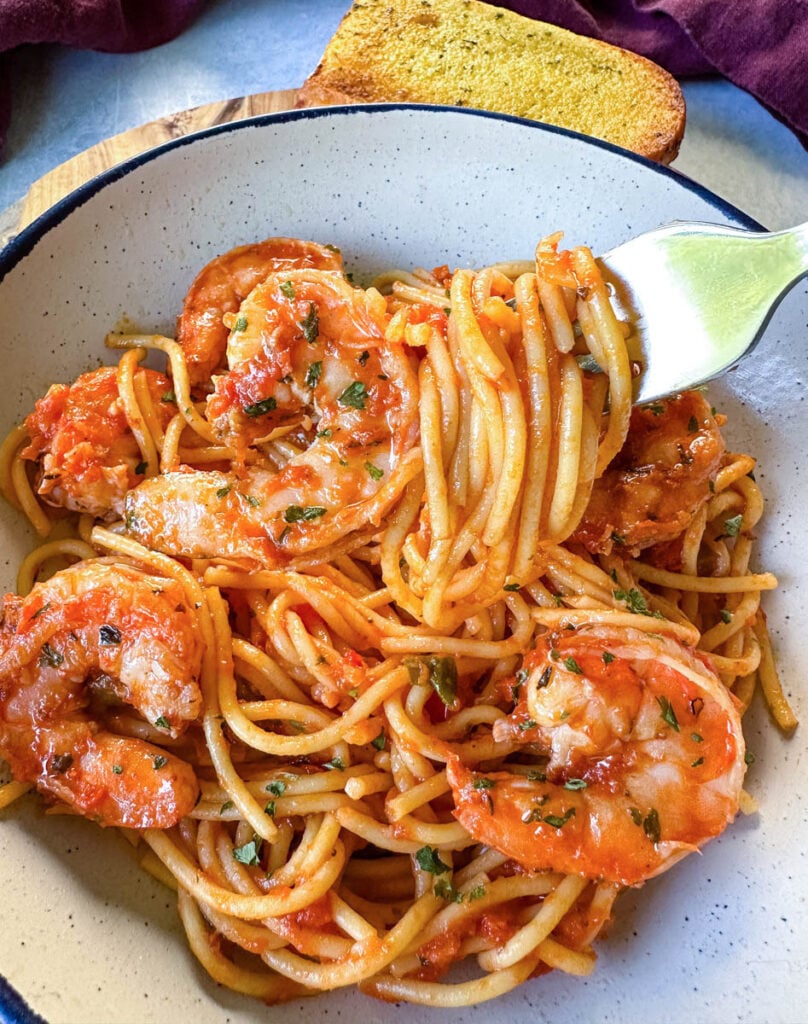
Additional Toppings and Substitution Ideas
- Scallops
- Crab
- Lobster
- Fresh Grated Parmesan
- Crushed Red Pepper
- Cajun Seasoning
- Mushrooms
- Spinach
- Broccoli
- Black Olives
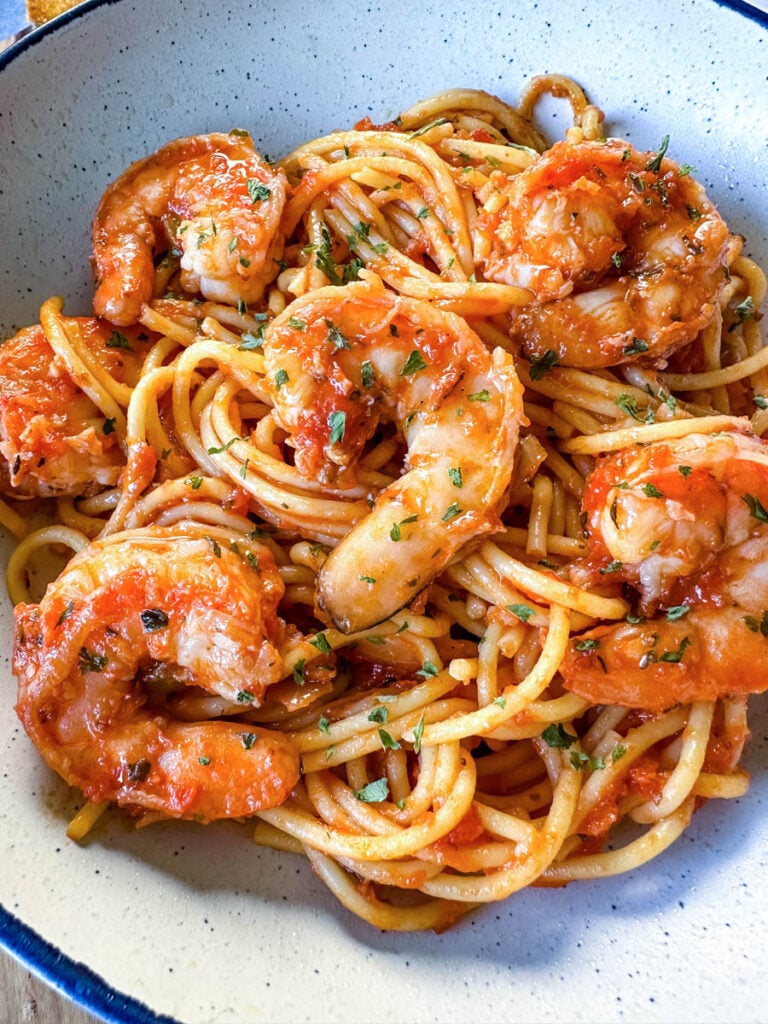
How to Store and Reheat
Leftovers can be stored in the fridge tightly sealed for 3-4 days. I reheat in the microwave. It will maintain its consistency and flavor if eaten within 3-4 days. It often tastes even better the next day because the flavors have gotten a chance to really sink in.
I recommend heating the shrimp separately from the pasta. As noted above, shrimp cooks fast. You will only need to reheat it for a short time, but the pasta and sauce may require a longer time to reheat and you don't want to risk ruining the shrimp.
Freezer Tips
You can freeze the dish tightly covered and sealed up to 2 months. With pasta, the faster you eat it after freezing, the better the texture and consistency.
Pair With These Recipes
Air Fryer Garlic Bread
Air Fryer Roasted Garlic
Roasted Brussels Sprouts with Garlic
More Shrimp and Seafood Recipes
Seafood Stuffed Mushrooms with Shrimp and Crab
Seafood Jambalaya with Shrimp
Seafood Gumbo
Shrimp Burger
Salmon Pasta Salad
Salmon Fettuccine Alfredo
Watch step by step instructions on how to make this recipe here on Youtube.
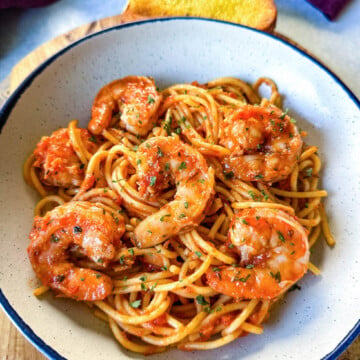
Shrimp Spaghetti
Want to save this recipe for later?
Equipment
Ingredients
- 8-10 oz spaghetti pasta See notes.
- 1 teaspoon olive oil
- 1 pound raw shrimp Peeled and deveined.
- 1 teaspoon Italian Seasoning
- salt and pepper to taste
- ½ cup chopped onion
- ½ cup chopped green peppers
- ½ cup chopped red peppers
- 4 garlic cloves Minced
Homemade Marinara Sauce (Feel free to use jarred, store-bought sauce if you wish).
- 28 oz canned crushed tomatoes
- 1 teaspoon ground oregano
- 3 fresh basil leaves chiffonade, sliced into strips ½ – 1 teaspoon if using dried. Adjust to taste.
- ⅓ cup dry white wine I use Pinot Grigio.
- ½-1 teaspoon Italian Seasoning Adjust to suit your taste.
- salt and pepper to taste
- 1 bay leaf
Instructions
- Cook the spaghetti in accordance with the instructions on the package. Prep your vegetables while the spaghetti cooks.
- Place a large pot or Dutch oven on medium-high heat (I use the same one I used to cook the pasta) with olive oil.
- Season the shrimp with Italian Seasoning, salt, and pepper to taste.
- Add the seasoned shrimp to the pot and cook for 3-5 minutes or until it is pink and opaque.
- Remove the shrimp from the pan and set aside. Add in the onions, green peppers, red peppers, and garlic. Saute until the onions and garlic are fragrant.
- Add in the crushed tomatoes, Italian seasoning, bay leaf, oregano, basil, salt, pepper, and wine. Stir.
- Taste repeatedly and adjust spices as necessary to suit your taste. The taste of the sauce is key to the overall taste of the dish.
- Fold in the cooked spaghetti and stir.
- Adjust the heat to medium-low and place the lid on the pot. Simmer and cook for 15-20 minutes.
- Open the pot and remove the bay leaf. Add the cooked shrimp to the pot and serve.
Notes
- Use less pasta if you like really saucy spaghetti and 10oz if you like an equal balance of sauce and pasta.
- Feel free to omit the wine if it isn’t your thing.
- Some people like sweet spaghetti sauce. Feel free to add sugar or sweetener if that's how you like it.
- I’m a huge fan of making this a one-pot recipe. I go for a 7-quart Dutch oven. It’s large enough to cook the pasta in and it can withhold higher heat for sauteeing the vegetables and shrimp. If you want to make this using one pot, grab one that’s large enough and retains heat well.
- As always, feel free to use a store-bought sauce if that’s your preference and you want to save some time.
- You can use whatever type of pasta you like including whole wheat (cook in accordance with the instructions on the package) or low carb spiralized vegetables.
Nutrition
Nutrition Data
Macros are provided as a courtesy and should not be construed as a guarantee. This information is calculated using MyFitnessPal.com. To obtain the most accurate nutritional information in a given recipe, you should calculate the nutritional information with the actual ingredients used in your recipe, using your preferred nutrition calculator. You are solely responsible for ensuring that any nutritional information provided is accurate, complete, and useful.

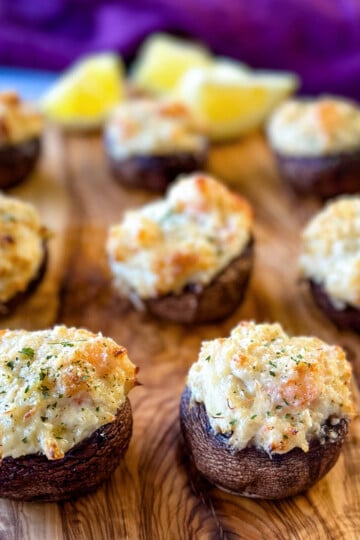
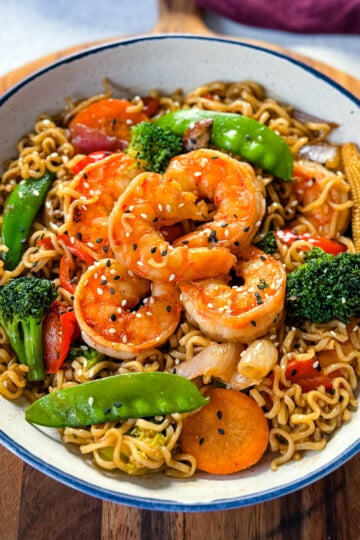
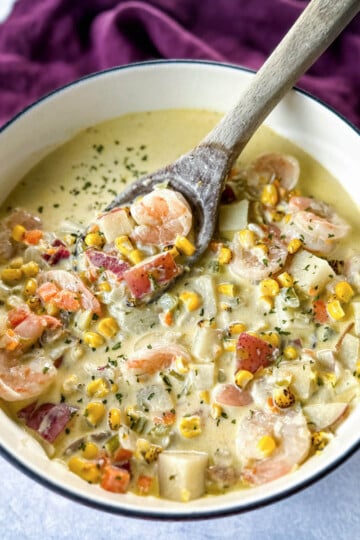
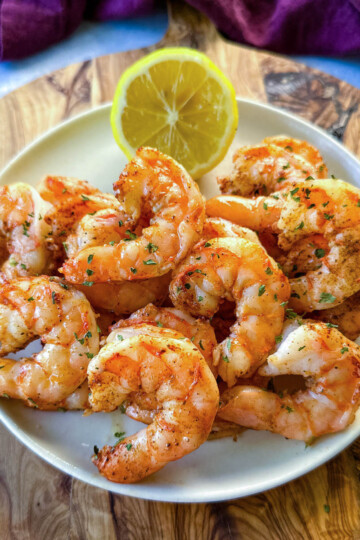
Ritu says
I find this recipe very tasty. I have made this recipe several times. This recipe can be made with ingredients in the fridge. This is why this recipe seems so easy to me.
staysnatched says
Ao glad to hear it!